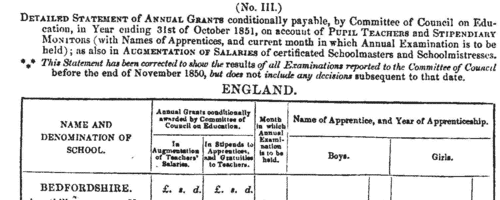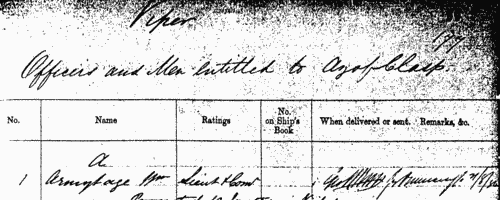Dryer Surname Ancestry ResultsOur indexes 1845-1865 include entries for the spelling 'dryer'. In the period you have requested, we have the following 6 records (displaying 1 to 6): Buy all | | | Get all 6 records to view, to save and print for £38.00 |
These sample scans are from the original record. You will get scans of the full pages or articles where the surname you searched for has been found. Your web browser may prevent the sample windows from opening; in this case please change your browser settings to allow pop-up windows from this site. Pupil Teachers in Devonshire: Boys
(1851)
The Committee of Council on Education awarded annual grants for the training and support of pupil teachers and stipendiary monitors in schools in England, Wales, Scotland, the Isle of Man and the Channel Islands. Pupil teachers started training between the ages of 13 and 15, and 'must not be subject to any bodily infirmity likely to impair their usefulness as Pupil Teachers, such as scrofula, fits, asthma, deafness, great imperfections in the sight or voice, the loss of an eye from constitutional disease, or the loss of an arm or leg, or the permanent disability of either arm or leg, curvature of the spine, or a hereditary tendency to insanity'.
They also had to obtain certificates from the managers of the school (and their clergyman, in the case of Church of England schools) as to their moral character and that of their family; good conduct; punctuality, diligence, obedience, and attention to duty; and attentiveness to their religious duties.
This detailed statement in the annual report of the committee for the year ending 31 October 1851 lists schools by county, giving:
1. Name and Denomination of School, with these abbreviations - B, British and Foreign School Society; F. C., Free Church of Scotland; H. C., Home and Colonial School Society; N., National Society, or connected with the Church of England; R. C., Roman Catholic Poor-School Committee; Wesn., Wesleyan Methodist.
2. Annual grants conditionally awarded by the committee in augmentation of teachers' salaries, and in stipends to apprentices, and gratuities to teachers.
3. Month in which annual examination was to be held.
4. Names of apprentices, giving surname and initials, and year of apprenticeship. Stipendiary monitors are indicated by (S. M.).DRYER. Cost: £6.00.  | Sample scan, click to enlarge

|  Sailors and marines on H. M. S. Viper in the Crimean War
(1854-1856) Sailors and marines on H. M. S. Viper in the Crimean War
(1854-1856)
Sebastopol in the Crimea was the great Russian naval arsenal on the Black Sea. A combined assault by British, French and Turkish troops resulted in the reduction of Sebastopol and led to the Treaty of Paris of 27 April 1856, guaranteeing the independence of the Ottoman Empire. By Admiralty Order the Crimea Medal was awarded to sailors and marines present during the campaign, between 17 September 1854 (the first landing at Eupatoria) and 9 September 1855 (when the allies secured Sebastopol). The sailors' medals were mostly delivered to them on board ship in the course of 1856; the marines' medals were sent to their respective headquarters for distribution. The remarks as to distribution in this medal roll therefore give more specific information as to the whereabouts of the sailor recipients in 1856 than about the marines. Her Majesty's Ship Viper, a 6-gun sailing ship, took part in the assault. Four clasps to this medal were awarded to the men present in the actions at Sebastopol itself, Inkerman, Balaklave (Balaclava) and (the sea of) Azoff, but the recipients of these clasps are recorded on separate rolls, not part of this index, but indexed on this site.DRYER. Cost: £8.00.  | Sample scan, click to enlarge

|  Sailors of H. M. S. Viper who fought in the Azoff Sea
(1854-1856) Sailors of H. M. S. Viper who fought in the Azoff Sea
(1854-1856)
Sebastopol in the Crimea was the great Russian naval arsenal on the Black Sea. A combined assault by British, French and Turkish troops resulted in the reduction of Sebastopol and led to the Treaty of Paris of 27 April 1856, guaranteeing the independence of the Ottoman Empire. By Admiralty Order the Crimea Medal was awarded to sailors and marines present during the campaign, between 17 September 1854 (the first landing at Eupatoria) and 9 September 1855 (when the allies secured Sebastopol). Her Majesty's Ship Viper, a 6-gun sailing ship, took part in the assault. Four clasps to this medal were awarded to the men present in the actions at Sebastopol itself, Inkerman, Balaklave (Balaclava) and (the sea of) Azoff. The Sea of Azoff (Azov, Azoph, Azof), east of the Crimean peninsula, is an arm of the Black Sea, with which it is united by the Straits of Kertch or Kaffa. This is the Azoff Clasp Roll, recording the names of the men from the ship who took part in the actions on the Azoff Sea during the Crimean War.DRYER. Cost: £8.00.  | Sample scan, click to enlarge

| Schoolmasters and trainees with Certificates of Merit
(1856)
The Committee of Council on Education for England and Wales produced an annual report which included several lists of teachers and trainee teachers, including an Annual Calendar of Teachers who have Obtained Certificates of Merit (completed to 1 January 1856), from which this sample scan is taken. The teachers are listed alphabetically by surname and initial, with name of school, post town or county, and grade, as either certificate or class. Student teachers were classed at the end of each year of training, so the column for class shows a student's class (1, 2 or 3) at the end of their first or second year of training. The teacher may then be awarded a certificate of merit by Her Majesty's Inspector, in which case the class and division of the certificate awarded appears in the columns for Certificate. No certificate of merit was granted a student, as a teacher, until he or she had been for two years in charge of the same elementary school, and the certificate was granted on the basis of two reports of performance as a teacher in school. If the first report was favourable, the teacher was paid for the first year on the scale of the lowest class; if the second report was favourable, augmentation and class of certificate was fixed for the next five years, after which (and so on from time to time) the certificates were open to revision. The value of the certificate, in the first instance, was not fixed higher than the first division of the third class, for any student who had resided less than two years at a training school under inspection. This is the index to the schoolmasters and male students in training schools. DRYER. Cost: £6.00.  | Sample scan, click to enlarge

| Traders and professionals in London
(1856)
The Post Office London Directory for 1856 includes this 'Commercial and Professional Directory', recording over 100,000 individuals. DRYER. Cost: £4.00.  | Sample scan, click to enlarge

| Unclaimed Naval Prize Money
(1855-1902)
Various prize moneys were awarded to officers and men who served on board her Majesty's ships. For one reason or another a substantial number of these prizes, from as little as a shilling or two to as much as many pounds, remained undistributed by 1902, when this comprehensive list of the unclaimed moneys was printed: it lists unclaimed shares of prize money, slave and pirate bounties, salvage awards, parliamentary grants, gratuities and other moneys distributed by the Admiralty 1855 to 1902, but which omits moneys for service on the China Station during the war of 1856 to 1880, and special gratuities for service in Egypt (1882), Soudan (1884) and Soudan and Nile Expedition (1884-1885), for which there are separate indexes. In each case the sailor's name is given first (surname, then christian name or initials); rank or rating; ship in which serving at time of capture or award; and the amount due.DRYER. Cost: £6.00.  | Sample scan, click to enlarge

|
Research your ancestry, family history, genealogy and one-name study by direct access to original records and archives indexed by surname.
|









